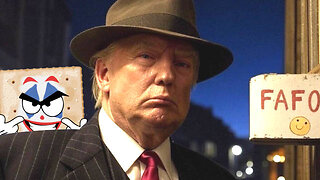Premium Only Content

History of Palestinians Genocides.
Genocide is the deliberate and systematic destruction, in whole or in part, of an ethnic, racial, religious, or national group. The term was coined in 1944 by Raphael Lemkin. It is defined in Article 2 of the Convention on the Prevention and Punishment of the Crime of Genocide (CPPCG) of 1948 as "any of the following acts committed with intent to destroy, in whole or in part, a national, ethnical, racial, or religious group, as such: killing members of the group; causing serious bodily or mental harm to members of the group; deliberately inflicting on the group's conditions of life, calculated to bring about its physical destruction in whole or in part; imposing measures intended to prevent births within the group; [and] forcibly transferring children of the group to another group."[1]
The preamble to the CPPCG states that "genocide is a crime under international law, contrary to the spirit and aims of the United Nations and condemned by the civilized world", and it also states that "at all periods of history genocide has inflicted great losses on humanity."[1]
Definitions of genocide
See also: Genocide definitions
The debate continues over what legally constitutes genocide. One definition is any conflict that the International Criminal Court has so designated. Mohammed Hassan Kakar argues that the definition should include political groups or any group so defined by the perpetrator.[2] He prefers the definition from Frank Chalk and Kurt Jonassohn, which defines genocide as "a form of one-sided mass killing in which a state or other authority intends to destroy a group so defined by the perpetrator."[3]
In literature, some scholars have popularly emphasized the role that the Soviet Union played in excluding political groups from the international definition of genocide, which is contained in the Genocide Convention of 1948,[4] and in particular they have written that Joseph Stalin may have feared greater international scrutiny of the political killings that occurred in the country, such as the Great Purge;[5] however, this claim is not supported by evidence. The Soviet view was shared and supported by many diverse countries, and they were also in line with Raphael Lemkin's original conception,[a] and it was originally promoted by the World Jewish Congress.[7]
Genocides before World War I
Main article: Genocides in history (before World War I)
Analysis of genocides before World War I is the result of modern studies that apply objectivity and fact, while previous accounts of genocides mostly aimed to emphasize one's own superiority. According to Frank Chalk, Helen Fein, and Kurt Jonassohn, if a dominant group of people had little in common with a marginalized group of people, it was easy for the dominant group to define the marginalized group as a subhuman group; the marginalized group might be labeled a threat that must be eliminated.[8]
While the concept of genocide was formulated by Lemkin in the mid-20th century, the expansion of various European colonial powers, such as the British and the Spanish Empires, and the subsequent establishment of colonies on indigenous territory frequently involved acts of genocidal violence against indigenous groups in the Americas (including Brazil, Paraguay, and the United States), Australia, Africa, and Asia.[9] According to Lemkin, colonization was in itself "intrinsically genocidal", and he saw this genocide as a two-stage process, the first being the destruction of the indigenous population's way of life. In the second stage, the newcomers impose their way of life on the indigenous group.[10][11] According to David Maybury-Lewis, imperial and colonial forms of genocide are enacted in two main ways, either through the deliberate clearing of territories of their original inhabitants to make them exploitable for purposes of resource extraction or colonial settlements, or through enlisting indigenous peoples as forced laborers in colonialist or imperialist projects of resource extraction.[12] The designation of specific events as genocidal is often controversial.[13]
During the 17th century Beaver Wars, the Iroquois destroyed several large tribal confederacies, including the Mohicans, Huron, Neutral, Erie, Susquehannock, and northern Algonquins, with the extreme brutality and exterminatory nature of the mode of warfare practised by the Iroquois causing some historians to label these events as acts of genocide.[14]
Genocides from World War I through World War II
Main article: Genocides in history (World War I through World War II)
In 1915, one year after the outbreak of World War I, the concept of crimes against humanity was introduced into international relations for the first time, when the Allies of World War I sent a letter to the government of the Ottoman Empire, a member of the Central Powers, to protest against the late Ottoman genocides that were taking place within the empire, among them, the Armenian genocide, the Assyrian genocide, the Greek genocide, and the Great Famine of Mount Lebanon.[15] The Holocaust, the Nazi genocide of six million European Jews from 1941 to 1945 during the Second World War,[16][17] is the most studied genocide,[18] and it is also a prototype of genocide;[19] one of the most controversial questions among comparative scholars is the question of the Holocaust's uniqueness, which led to the Historikerstreit in West Germany during the 1980s,[20] and whether there exist historical parallels, which critics believe trivializes it.[21] It is considered to be the "worst case" paradigm of genocide.[22]
Genocide studies started as a side academic field of Holocaust studies, whose researchers associated genocide with the Holocaust and believed that Raphael Lemkin's definition of genocide was too broad.[19] In 1985, the United Nations' (UN) Whitaker Report cited the massacre of 100,000 to 250,000 Jews in more than 2,000 pogroms which occurred as part of the White Terror during the Russian Civil War as an act of genocide; it also suggested that consideration should be given to ecocide, ethnocide, and cultural genocide.[23]
Genocides from 1946 through 1999
Main article: Genocides in history (1946 to 1999)
The Genocide Convention was adopted by the UN General Assembly on 9 December 1948 and came into effect on 12 January 1951. After the necessary twenty countries became parties to the convention, it came into force as international law on 12 January 1951;[24] however, only two of the five permanent members of the UN Security Council were parties to the treaty, which caused the Convention to languish for over four decades.[25] During the Cold War era, mass atrocities were committed by anti-communist/capitalist regimes,[26][27] as well as by communist regimes,[28] among them the Indonesian mass killings of 1965–66, the 1971 Bangladesh genocide, the Cambodian genocide, the 1984 Sikh genocide, the Guatemalan genocide and the East Timor genocide.[29]
The Rwandan genocide gave an extra impetus to genocide studies in the 1990s.[30]
Genocides after 2000
Main article: Genocides in history (21st century)
Skulls of victims of the Rwandan genocide
In The Guardian, David Alton, Helen Clark, and Michael Lapsley wrote that the reasons for the Rwandan genocide and crimes such as the Bosnian genocide of the Yugoslav Wars had been analyzed in-depth, and they also stated that genocide prevention had been extensively discussed. They described the analyses as producing "reams of paper [that] were dedicated to analyzing the past and pledging to heed warning signs and prevent genocide."[31]
A group of 34 non-governmental organizations and 31 individuals, calling themselves African Citizens, referred to the Rwanda: The Preventable Genocide report prepared by a panel headed by former Botswana president Quett Masire for the Organisation of African Unity, which later became the African Union.[32] African Citizens highlighted the sentences, commenting: "Indisputably, the most important truth that emerges from our investigation is that the Rwandan genocide could have been prevented by those in the international community who had the position and means to do so. ... The world failed Rwanda. ... [The United Nations] simply did not care enough about Rwanda to intervene appropriately."[33] Chidi Odinkalu, former head of the National Human Rights Commission of Nigeria, was among those involved with African Citizens.[34]
The ongoing Amhara genocide started in the early 1990s with the implementation of ethnic federalism under the TPLF-led ruling, and events of the Northern Ethiopia war (Tigray conflict) since 2020 that intensified the violence further with war crimes committed by the Tigray forces in both the Amhara & Afar regions. On 20 November 2021, Genocide Watch called for genocide in Ethiopia, predicted in the context of the war in Tigray and also the violence across the Oromia, and the Benishangul-Gumuz (Metekel) regions that worsened since 2018.[35] On 21 November, Odinkalu called for genocide prevention, stating: "We need to focus on an urgent programme of Genocide Prevention advocacy on Ethiopia NOW. It may be too late in 2 weeks, guys."[34] On 26 November, African Citizens and Alton, Clark, and Lapsley also called for the predicted genocide to be prevented.[31][33]
The Rohingya genocide is an ongoing genocide of the Muslim Rohingya people consisting of arson, rape, ethnic cleansing, and infanticide by the Burmese military. The genocide has so far consisted of two phases so: the first was a military crackdown that occurred from October 2016 to January 2017, and the second has been occurring since August 2017.[36][37]
The Chinese government has engaged in a series of human rights abuses against Uyghurs and other ethnic and religious minorities in Xinjiang.[38] Legislatures in several countries, including Canada,[39] the United Kingdom,[40] and France,[41] have passed non-binding motions describing China's actions as genocide. The United States officially denounced China's treatment of Uyghurs as a genocide.[42]
International prosecution
Ad hoc tribunals
In 1951, only two of the five permanent members of the UN Security Council (UNSC) were parties to the convention, namely France and the Republic of China. The treaty was ratified by the Soviet Union in 1954, the United Kingdom in 1970, the People's Republic of China in 1983 (having replaced the Taiwan-based Republic of China on the UNSC in 1971), and the United States in 1988.[43] In the 1990s, the international law on the crime of genocide began to be enforced.[25]
Bosnia and Herzegovina
See also: Bosnian genocide and Srebrenica massacre
Exhumed mass grave of Srebrenica massacre victims in 2007
In July 1995, Serbian forces killed more than 8,000[44][45][46
-
 12:29
12:29
Mr. Build It
5 days agoWish I Knew This Before I Started Building It
3.03K6 -
 2:03:57
2:03:57
Megyn Kelly
2 days agoNew Trump Derangement Syndrome, and How CNN Smeared a Navy Veteran, w/ Piers Morgan & Zachary Young
41.3K98 -
 10:05
10:05
DIY Wife
3 years agoHow We Flip Old Furniture For Profit!
17.9K56 -
 2:14:54
2:14:54
TheSaltyCracker
3 hours agoTrump Goes Gangster ReeEEeE Stream 01-26-25
55.8K170 -
 LIVE
LIVE
Due Dissidence
12 hours agoTrump Calls To "CLEAN OUT" Gaza, Swiss ARREST Pro-Palestine Journalist, MAGA's Hollywood Makeover?
3,170 watching -
 2:02:20
2:02:20
Nerdrotic
4 hours ago $12.23 earnedDECLASSIFIED: JFK, MLK UFO Immaculate Constellation Doc | Forbidden Frontier #089
53.4K6 -
 3:00:14
3:00:14
vivafrei
12 hours agoEp. 248: "Bitcoin Jesus" Begs Trump! Rekieta Gets Plea Deal! Pardons, Deportations, Bird Flu & MORE!
104K135 -
 3:44:06
3:44:06
Rising Rhino
11 hours ago $11.78 earnedWashington Commanders Vs Philadelphia Eagles: NFL NFC Championship LIVE Watch Party
46.2K4 -
 13:00
13:00
Exploring With Nug
5 hours ago $3.83 earnedHe Went To Get A Haircut And Vanished WIthout a Trace!
34.3K2 -
 18:53
18:53
DeVory Darkins
1 day ago $26.35 earnedTrump JUST ENDED Mayor Karen Bass During HEATED Meeting
70.3K212